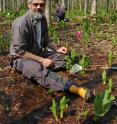Loss of wild insects hurts crops around the world
Researchers studying data from 600 fields in 20 countries have found that managed honey bees are not as successful at pollinating crops as wild insects, primarily wild bees, suggesting the continuing loss of wild insects in many agricultural landscapes has negative consequences for crop harvests. The study, which prompts an urgent call to maintain and manage pollinator diversity for long-term agricultural production, is published today in the journal Science.
The 50 international researchers, including Lawrence Harder, professor in the Department of Biological Sciences in the Faculty of Science at the University of Calgary, analysed data from 41 crop systems around the world including fruits, seeds, nuts, and coffee to examine the consequences of having abundant wild pollinators for crop pollination.
"Our study demonstrates that production of many fruit and seed crops that make diets interesting, such as tomatoes, coffee and watermelon, is limited because their flowers are not adequately pollinated," says Harder. "We also show that adding more honey bees often does not fix this problem, but that increased service by wild insects would help."
Flowers of most crops need to receive pollen before making seeds and fruits, a process that is enhanced by insects that visit flowers. These pollinators, including bees, flies, butterflies and beetles, usually live in natural or semi-natural habitats, such as the edges of forests, hedgerows or grasslands. As these habitats are lost, primarily owing to conversion to agriculture, the abundance and diversity of pollinators decline and crops receive fewer visits from wild insects.
The study found that the proportion of flowers producing fruits was considerably lower in sites with fewer wild insects visiting crop flowers. Therefore, the reduction of wild insects in agricultural landscapes will likely impact both our natural heritage and agricultural harvest.
"Paradoxically, most common approaches to increase agricultural efficiency, such as cultivation of all available land and the use of pesticides, reduce the abundance and variety of wild insects that could increase production of these crops," says Harder. "Our study highlights the benefits of considering this paradox in designing and implementing agricultural systems."
The study suggests that new practices for integrated management of both honey bees and wild insects will enhance global yields of animal-pollinated crops and promote long-term agricultural production. These practices should include conservation or restoration of natural or semi-natural areas within croplands, promotion of a variety of land use, addition of diverse floral and nesting resources, and more prudent use of insecticides that can kill pollinators.
Source: University of Calgary
Other sources
- Native pollinators boost crop yields worldwidefrom Sciencenews.orgFri, 1 Mar 2013, 19:50:07 UTC
- Wild bees boost harvest more than honeybeesfrom CBC: Technology & ScienceFri, 1 Mar 2013, 19:00:41 UTC
- Loss of wild insects hurts crops around the worldfrom Science DailyFri, 1 Mar 2013, 2:31:15 UTC
- Farmers' lack of bees might be solved by going wildfrom LA Times - ScienceFri, 1 Mar 2013, 2:30:26 UTC
- Loss of wild pollinators serious threat to crop yields, study findsfrom The Guardian - ScienceThu, 28 Feb 2013, 19:20:12 UTC
- Loss of wild insects hurts crops around the worldfrom PhysorgThu, 28 Feb 2013, 19:00:13 UTC
